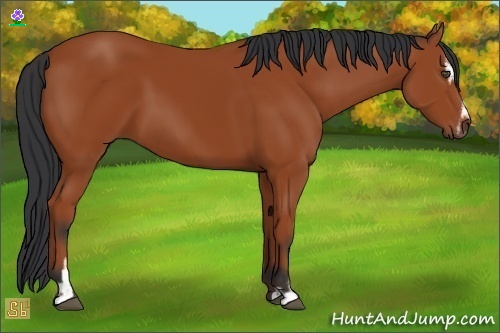X
HGG Community Forums
Log In to HorseGeneticsGame
HGG Community Forums
Join our discord server!
Howdy, Stranger!
It looks like you're new here. If you want to get involved, click one of these buttons!
Categories
- All Discussions61,371
- Announcements1,188
- HAJ Discussion59,028
- ↳ New Member Introductions68
- ↳ Help Me Out5,089
- ↳ Horses for Sale and Auction14,459
- ↳ Breeding Ads and Sales6,079
- ↳ Herd Helpers22,965
- ↳ Bug Discussion6
- Non HAJ Discussion1,155
- ↳ Saddle Sisterhood113
- ↳ Games, Contests and GiveAWays348
- ↳ Genetics305
In this Discussion
- SandyCreekAcres June 2015
Who's Online (3)
- GoldenSpur 2:19AM
- Pagan 2:19AM
- Taliesin 2:20AM
Liver Chestnut & Brown Color Explanation
-
I was wondering if someone could explain these colors to me...
I own this stallion http://www.huntandjump.com/horse.php?horseid=3375047
and I was wondering what part of his genetic code makes him a liver vs a regular chestnut
I also have this stallion http://www.huntandjump.com/horse.php?horseid=3365885
and I was wondering what parts of his genetic code makes him a brown and not a bay.
Also why do some bays appear very dark while others are very light?
For Example:
http://www.huntandjump.com/horse.php?horseid=2883041
http://www.huntandjump.com/horse.php?horseid=2776958 (notice how this one has a lot more bright/light red color on its body ... why is that?)
http://www.huntandjump.com/horse.php?horseid=2823173
And why do some have lighter legs then other?
like this one http://www.huntandjump.com/horse.php?horseid=2199214Merry Mount Farm ID# 219220 -
The first horse, Jenesaisquoi, is a liver chestnut because he is homozygous for sooty and heterozygous DP (dense pheomelanin). DP is not included in the gene test, so we have to infer its presence from the darkness of the horse compared to how many copies of sooty it has. Ammit has very kindly added liver chestnut to that result of the test, but anything thing else doesn't have a mention in the name (black chestnuts, black palominos, black buckskins which are all homozygous for both sooty and DP).
Bravado is a brown because he is homozygous for sooty and has the brown allele of agouti (At). At is the least dominant of the agouti alleles except for the recessive a; a horse that is Ata will always be brown, and can be distinguished by the almost black coloration on the neck. If a horse is AtAt it will be brown if it has any amount of sooty but bay if they only have the recessive sooty allele (S).
The darker bays will have at least one dominant Ssty allele and probably no pangere, which lightens the color behind the forelegs, in front of the hind legs, and on the muzzle. Your first bay is homozygous for sooty and hasn't been rerolled since Ammit reworked bays in the new image generator. The second one definitely has one dominant pangere and one sooty and so falls into the mid-range of bay variations with the pangere lightening. The third one has no sooty and no pangere. The lighter legs on the last one is one of the random variations on the bay coloration. A bay with even lighter legs than that will probably have the fourth agouti allele, A+ or wild bay.
http://www.huntandjump.com/horse.php?horseid=3104751
Wild bay is dominant over all other agouti alleles.Post edited by SandyCreekAcres at 2015-06-18 15:29:39 Thanked by 1Ammit
Thanked by 1Ammit














